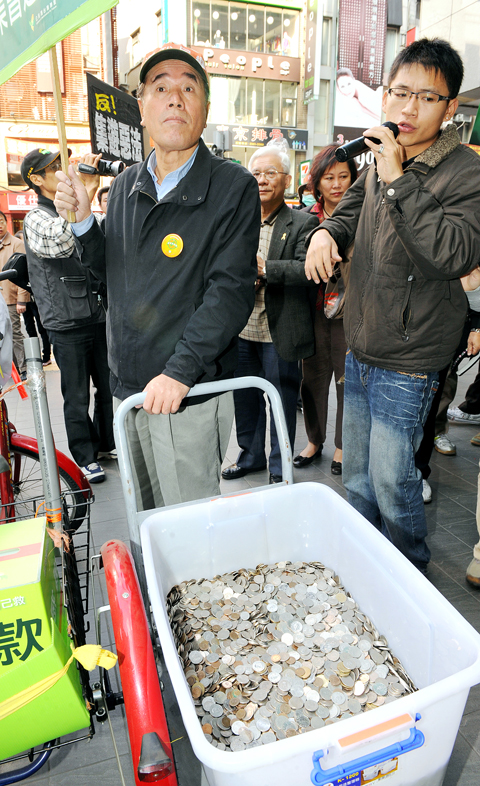|
Activist criticizes police for fining
him for 'walking'
TAKING A STROLL: Tsay Ting-kuei of the Taiwan Referendum
Alliance said police fined him for simply 'walking around' outside the
Presidential Office
By Loa Iok-sin
STAFF REPORTER
Saturday, Jan 30, 2010, Page 3

Taiwan Referendum Alliance convener Tsay Ting-kuei, left, and his supporters
stand outside Zhongzheng First Precinct police station in Taipei on Wednesday
with donations to help pay fines he received for allegedly violating the
Assembly and Parade Act.
PHOTO: LO PEI-DER, TAIPEI TIMES
Taiwan Referendum Alliance convener Tsay Ting-kuei (蔡丁貴)
yesterday criticized the police for fining him for violating the Assembly and
Parade Act (集會遊行法) when he walked around outside the Presidential Office with a
donation box and some supporters on Wednesday.
Tsay went to Zhongzheng First Precinct police station on Wednesday to pay the
fines he had previously received for violating the Act. Tsay had received
tickets totaling more than NT$800,000 because he has been conducting a sit-in
demonstration against the Assembly and Parade Act outside the Legislative Yuan
since October 2008.
Because Tsay found that he did not have enough money to pay the fines, he
decided to walk around with a donation box to raise money.
Tsay and his supporters were stopped by the police when they approached the side
gate of the Presidential Office. They refused to stop and continued to walk
around. They received a warning from the police, who said that Tsay and his
supporters were in violation of the Assembly and Parade Act and they were asked
to “disband.”
“We were only a few people walking on the street trying to raise money, it was
neither an assembly nor a parade,” Tsay told the Taipei Times.
“It’s my freedom to wear whatever I want and take whatever I want when I walk on
the street — the police have violated my freedom,” he said.
He said while there were other people with him, police officers only surrounded
him.
“Is there a law that says that Tsay Ting-kuei cannot walk around the
Presidential Office?” he asked. “They could arrest me if I had tried to walk
into the Presidential Office, but I was merely walking on the sidewalk outside.
The police abused their power.”
Taiwan Association for Human Rights secretary-general Tsai Chi-hsun (蔡季勳) agreed
with Tsay.
Tsai said what had happened to Tsay showed that the Assembly and Parade Act is
ridiculous and unnecessary.
“What Tsay Ting-kuei did would not be considered a violation of the Assembly and
Parade Act if he did it elsewhere. What he did was declared illegal because the
Presidential Office is a ‘sensitive’ place,” Tsai said. “This shows that the Act
gives police too much power to decide what constitutes a violation of the law.”
On the other hand, police said the way officers acted was legal and justified.
“[Tsay and his supporters] walked in group — though there was quite a distance
between them — and they held placards with slogans. Of course it was a
demonstration,” said Yang Chih-chieh (楊志傑), the commander at the scene on
Wednesday. “We may allow them to walk around elsewhere, but the area surrounding
the Presidential Office is a restricted zone, so we had to stop them.”
Zhongzheng First Police Precinct Chief Inspector Jason Yu (于增祥) said he
understood why many people do not like the Assembly and Parade Act.
“Whether it’s a good law or a bad law, as long as it’s still there we have to
enforce it,” he said.
|
![]()
![]()
![]()